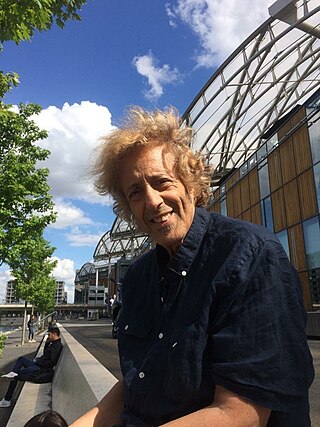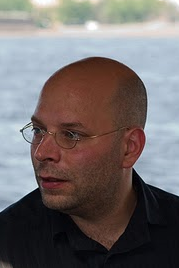
Jean-Pierre Faye (born 19 July 1925) is a French philosopher and writer of fiction and prose poetry.

Jean-Pierre Faye (born 19 July 1925) is a French philosopher and writer of fiction and prose poetry.
Faye was born in Paris. He was member of the editing committee of the avant-garde literary review Tel Quel , [1] and later of Change. He received the Prix Renaudot for his 1964 novel L'Écluse (Éditions Seuil). He is a regular contributor to Gilles Deleuze's literary journal Chimère. With Jacques Derrida and others, he authored the "Blue Report" (French : Le rapport bleu), which led to the Collège international de philosophie, an open university, in 1983. He soon turned against deconstructionism and postmodernism, as he reflected in Langages totalitaires 2: la raison narrative (1995). His essays, including Théorie du récit and Langages Totalitaires, remain influential studies of the use and abuse of language by totalitarian states and ideologies. Faye is credited with creating the horseshoe theory. [2] [3] [4]

Guillaume Faye was a French political theorist, journalist, writer, and leading member of the French New Right.
The Groupement de Recherche et d'Études pour la Civilisation Européenne, better known as GRECE, is a French ethnonationalist think tank founded in 1968 to promote the ideas of the Nouvelle Droite. GRECE founding member Alain de Benoist has been described as its leader and "most authoritative spokesman". Prominent former members include Guillaume Faye and Jean-Yves Le Gallou.

Jacques Bouveresse was a French philosopher who wrote on subjects including Ludwig Wittgenstein, Robert Musil, Karl Kraus, philosophy of science, epistemology, philosophy of mathematics and analytical philosophy. Bouveresse was called "an avis rara among the better known French philosophers in his championing of critical standards of thought."
Clément Rosset was a French philosopher and writer. He was a professor of philosophy at the University of Nice Sophia Antipolis, and the author of books on 20th-century philosophy and postmodern philosophy.

Sandra Laugier is a French philosopher, who works on moral philosophy, political philosophy, philosophy of language, gender studies, and popular culture. She is a full professor of philosophy at the University of Paris 1 Panthéon-Sorbonne and a Senior member of the Institut Universitaire de France. She currently serves as the deputy director of the Institut des sciences juridique et philosophique de la Sorbonne. In 2014, she received the title of the Chevalier de la Légion d’honneur. In 2022, she was awarded the Grand Prix Moron by the Académie française. In 2024, she was elected to the American Philosophical Society.

Laurent Gaudé is a French writer.

Shmuel Trigano is a sociologist, philosopher, professor emeritus of sociology at Paris Nanterre University. He was Tikvah Fund Visiting Professor in Jewish Law and Thought at Benjamin N. Cardozo School of Law, New York (2009), and Templeton Fellow at the Herzl Institute (Jerusalem) program "Philosophy of the Tanakh, Midrash and Talmud" (2012-2013), (2015-2017). Elia Benamozegh European Chair of Sephardic Studies, Livorno, Italy (2002).

In popular discourse, the horseshoe theory asserts that advocates of the far-left and the far-right, rather than being at opposite and opposing ends of a linear continuum of the political spectrum, closely resemble each other, analogous to the way that the opposite ends of a horseshoe are close together. The theory is attributed to the French philosopher and writer of fiction and poetry Jean-Pierre Faye in his 1972 book Théorie du récit: introduction aux langages totalitaires, in relation to Otto Strasser.
Jean-Marie Brohm is a French sociologist, anthropologist and philosopher. Professor of sociology at the University of Montpellier III, he was also the founder of the journal Quel Corps ?, member of the editorial staff of the monthly Répertoire and is actually director of the journal Prétentaine. Brohm has written many books and is the leading proponent of the radical critique of sport in France.

Georges-Elia Sarfati is a philosopher, linguist, poet, and an existentialist psychoanalyst, author of written works in the domains of ethics, Jewish thought, social criticism, and discourse analysis. He has translated Viktor E. Frankl. He is the grand-nephew of the sociologist Gaston Bouthoul.

Miguel Abensour was a French philosopher specializing in political philosophy.
Jean-Louis Dessalles is a French computer scientist and researcher in artificial intelligence and cognitive science, professor à Télécom Paris (Paris). He is best known for his contributions to the Simplicity theory and for his original theory about a possible political origin of language.

Joseph Vialatoux was a French Catholic philosopher based in Lyon, a leading member of the Catholic social activist Chronique sociale. He had liberal Christian democratic views. He was a prolific author, and an early critic of the right-wing Action Française.
Jean-Pierre Dupuy is a French engineer and philosopher.
Alexandra Laignel-Lavastine is a French philosopher, essayist, and historian of East European history and culture.
Europe-Action was a far-right white nationalist and euro-nationalist magazine and movement, founded by Dominique Venner in 1963 and active until 1966. Distancing itself from pre-WWII fascist ideas such as anti-intellectualism, anti-parliamentarianism and traditional French nationalism, Europe-Action promoted a pan-European nationalism based on the "Occident"—or the "white peoples"— and a social Darwinism escorted by racialism, labeled "biological realism". These theories, along with the meta-political strategy of Venner, influenced young Europe-Action journalist Alain de Benoist and are deemed conducive to the creation of GRECE and the Nouvelle Droite in 1968.
Jean-Marie Pérouse de Montclos is a French architectural historian.

The Nationalists, is a far-right neo-fascist political movement in France originally established in 1983 by former National Front (FN) members, including former Waffen-SS members like Pierre Bousquet, Jean Castrillo, and Henri Simon, around the magazine Militant. Inactive after the early 1990s, it was reactivated in 2015 following the dissolution of the néo-Pétainist movement L'Œuvre Française by the French authorities in 2013. Far-right militant Yvan Benedetti serves as its current leader.

Lucien-Samir Oulahbib is a French sociologist, political scientist, writer and journalist who taught at the University Lyon 3, from 2007 until 2019. He taught at the University Paris X from 2005 to 2007 and now teaches at Albert le Grand Institute. He manages Dogma philosophy journal together with Isabelle Saillot.

Alexander Schnell is a German philosopher and professor at the University of Wuppertal.
Jean-Pierre Faye's famous horseshoe theory (according to which extremes meet) finds verification here more than in other places, and the two states of delirium often mingle and meet, unfortunately spreading beyond these extremist circles. But contrary to the legend deliberately maintained and/or the commonplace believed in good faith, Israel and the United States have not always been allies; on several occasions, their relations have even been strained.
A commonly received idea, one strengthened by the post-war debates about the nature of totalitarianism, is that 'extremes meet.' Rather than a straight line between the Left and Right poles, the political spectrum would look more like a circle, or a 'horseshoe,' a metaphor the philosopher Jean-Pierre Faye used to describe the position of German parties in 1932, from the Nazis to the Communists.
The so-called centrist/extremist or horseshoe theory points to notorious similarities between the two extremes of the political spectrum (e.g., authoritarianism). It remains alive though many sociologists consider it to have been thoroughly discredited (Berlet & Lyons, 2000). Furthermore, the ideological profiles of the two political poles have been found to differ considerably (Pavlopoulos, 2013). The centrist/extremist hypothesis narrows civic political debate and undermines progressive organizing. Matching the neo-Nazi with the radical left leads to the legitimization of far-right ideology and practices.